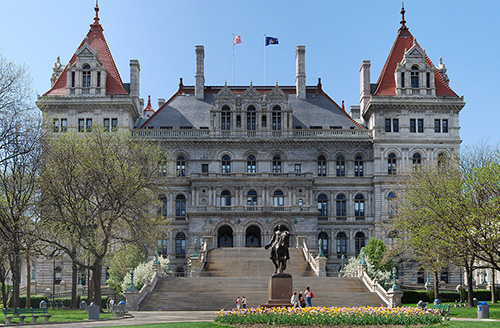Your Go-To Source for NYS Government AffairsTo learn how NYSNLA is protecting you--and representing you in Albany--please check out our Advocacy page.Make Sure You Are Up-to-Date on NYS Rules, Regulations & Services for the Green IndustryBelow please find two very helpful videos containing the latest news and updates from a host of New York State agencies--including DEC, Ags & Markets, DOT and DOL.
New Laws & Policies In Effect for 2023PAY TRANSPARENCY BILL (Takes effect on September 17, 2023) Covered Employers The law applies to:
Advertisement Obligations When advertising any job, promotion, or transfer opportunity (collectively, “position”) that can or will be performed, at least in part, in NYS, covered employers must disclose:
If the covered employer is advertising a position that will be paid solely on commission, it does not need to disclose the compensation/range of compensation for the position but must include a general statement that compensation will be based on commission. Recordkeeping Covered employers also have additional recordkeeping obligations. They must maintain “necessary records to comply with the requirements of [the law],” including records of position advertisements, the history of compensation ranges for advertised positions, and a job description for any advertised position (if one exists). These records are subject to review by the NYS Department of Labor. I’m Already Covered by a Pay Transparency Law! How Does That Work? Pay transparency laws are certainly not new in NYS. Other jurisdictions, such as NYC, Westchester County, and Albany County, already have similar laws on the books. At this juncture, it’s unclear how they’ll all jive together, but we do expect NYS to release regulations before its law goes into effect. In the meantime, we’ll keep an eye out for any hiccups in their implementation, and hopefully, NYS will learn from their challenges. What Should I Do? Employers throughout NYS can take some actions while awaiting further guidance from the NYS Department of Labor:
While you may want this to be a “future you” problem, now is the time to get ready for it. Think twice before taking employment action. Starting on February 19, 2023, all NYS employers may not “discharge, threaten, penalize, or in any other manner discriminate or retaliate against any employee” absent from work for a reason covered by federal, state, or local law. This includes maintaining any policy or practice that:
Legally-protected leaves run the gamut, including Family and Medical Leave Act (FMLA) leave, Paid Family Leave (PFL), COVID-19 leave, Paid Sick Leave (PSL), victims of crime leave, military leave, volunteer emergency responder leave, and more!
PUMPING SPACES (Starts May 31, 2023) NYS employers must provide reasonable unpaid break time (or permit employees to use paid break time) to express milk in the workplace for up to 3 years following the birth of a child and to “make reasonable efforts” to provide a room or other location, other than a restroom, to express milk in private.
What if I Can’t Meet the Nursing Space Requirements?
Employers will be required to provide this policy to all employees upon hire, annually thereafter, and to employees returning to work following the birth of a child. Employers would be well-advised to start reviewing their policies and procedures before these laws go into effect. Other Important Laws & Regulations You Need to Know AboutSEXUAL HARASSMENT POLICY (Instituted October 2018 / Updated April 2023) Every employer in the New York State is required to adopt a sexual harassment prevention policy. An employer that does not adopt the model policy must ensure that the policy that they adopt meets or exceeds the following minimum standards. April 2023: New York State officials have finalized an updated policy for combating sexual harassment in the workplace for employers in the private, as well as non-profit sectors.Changes include how to address remote workers, gender discrimination and retaliation in the workplace. At the same time, the Department of Labor also announced a new training video for employers, as well as online resources to help workers understand the new policy and mandatory training requirements. CLICK HERE for model policies, complaint forms, training requirements, videos, overview webinars and FAQs.
Click here to Find Your Assembly Member |


